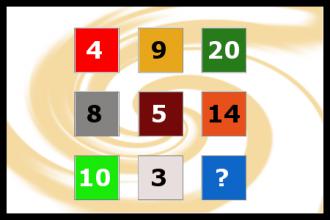Which number should replace the question mark?
Which number should replace the question mark?Correct answers: 148
The first user who solved this task is Djordje Timotijevic.
#brainteasers #math #riddles

A man was in his front yard mowing grass when his neighbor came out of the house and went straight to the mail box, opened it, then slammed it shut, and stormed back in the house.
A little later they came out again went to the mail box and again opened it, then slammed it shut again.
Angrily, back into the house they went.
As the man was getting ready to edge the lawn, the neighbor came out again, marched to the mail box, opened it and then slammed it closed harder than ever. Puzzled by his neighbors actions the man asked, "Is something wrong?"
To which the neighbor (who was not very computer savvy) replied, "There certainly is! My stupid computer keeps giving me a message saying, "YOU'VE GOT MAIL!"

